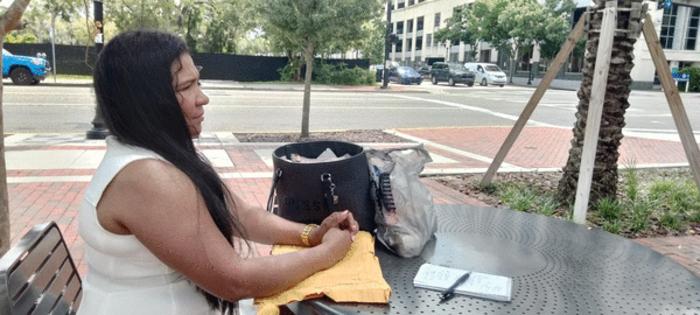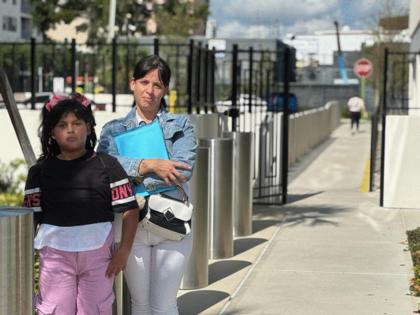As deportations rise, fees for immigration lawyers are going up
Published in News & Features
As detentions spike amid a historic immigration crackdown, so has the price of legal remedies for those facing deportation.
Take a typical marriage-based green card case in Florida. Seven years ago, it might cost immigrants about $4,000 in legal fees. Hiring an immigration attorney to defend against deportation? Back then it could run around $10,000.
Today, the costs of green card cases have more than tripled, running up to $15,000, according to the Seattle-based Boundless Immigration group, which assists immigrants and their families with the legal system. Defense against deportation fees jumped 20% to as much as $12,000 or more.
These costs hit hardest for immigrants in labor and service jobs, unlike tech or professional workers, whose companies can cover some or all immigration paperwork.
The price hikes are yet another lesson in supply-and-demand economics, reflecting the challenges of hiring an immigration attorney when the market is flooded with so many would-be clients.
Immigration attorneys point to a combination of heavier caseloads along with more complicated cases that demand additional time and resources as reasons for climbing costs, leaving a growing number of immigrants without representation.
Lisette Sanchez, an immigration attorney in Tampa, said preparing even a simple case requires far more research, strategy and documentation than it did a decade ago. Additional time raises costs.
Sanchez also said demand for qualified immigration counsel has never been higher, while the supply of experienced attorneys has not kept up.
“Fees have gone up, but they reflect the growing demands and pressures of practicing in these areas,” Sanchez said.
Adonia Simpson, deputy director for policy and pro bono at the American Bar Association’s Commission on Immigration, said backlogs in immigration courts can add to costs. Nationwide, there are 3.4 million such cases, according to the U.S. Department of Justice. Six in 10 people facing deportation lack legal counsel, according to the nonprofit Vera Institute of Justice.
In Florida, about 500,000 people are in immigration court proceedings, and nearly 370,000 lack a lawyer, according to federal data collected by Syracuse University.
In Hillsborough, Pinellas, Pasco and Polk counties, more than 57,000 people are in removal proceedings, data shows, and fewer than 1 in 4 has a lawyer. Over the summer, of 1,800 cases filed in those four counties, fewer than 1 in 5 had an attorney.
With new rules and policies, the work has become more difficult, said Simpson, requiring lengthy briefs, extensive evidence and careful client preparation.
The situation is daunting for immigrants who are detained and often on shortened timelines. With no court-appointed counsel, many proceed without representation, said Simpson.
“Having counsel can increase the likelihood of success on the merits of their case and improve efficiency of the courts,” said Simpson. “Unfortunately, due to funding cuts, many nonprofit organizations lack the capacity to provide free or low-cost representation.”
Robert Sichta, an immigration attorney with the Council on American-Islamic Relations in Florida, said the cost of hiring a lawyer is often out of reach for many, especially given their income levels. His group provides legal support but cannot take on every case, so it works with other attorneys who lower their fees and offer payment plans.
New fees and charges, including those tied to work permit applications for asylum-seekers, add another layer of financial strain, said Sichta.
U.S. Citizenship and Immigration Services announced rates for various forms and applications under the One Big Beautiful Bill Act, passed in July. Among the new costs:
—$550 for an initial employment authorization and $275 for renewals;
—a $100 filing fee for asylum applications and $100 annual asylum fee for pending cases;
—$250 for Special Immigrant Juvenile petitions, which apply to anyone under age 21.
—$500 for Temporary Protected Status, up from $50.
The fees increase each year based on inflation.
Many immigrants without legal representation have been in the country less than two years. Others are not yet employed and rely on temporary housing with family members or friends while they begin to settle into their communities.
“It’s an uphill battle that’s only getting worse,” Sichta said. “Unless, like regular courts, we start allowing the appointment of counsel paid for by government sources. As if that’s going to happen with the current administration.”
Alexa Figueroa arrived with no money when she crossed the southern border with her 10-year-old daughter last year using an app that allows immigrants to schedule appointments with border officials and request entry.
The app, CBP One, was introduced during the Biden administration. More than a million applied, obtaining work permits and receiving permission to stay in the country for up to two years.
Figueroa, 30, is unemployed and can barely cover her cellphone bill with the help of a sister she lives with in Davenport. Two weeks ago, she had her first hearing in immigration court in Orlando. No one was with her, except her daughter.
At the hearing, Figueroa said the judge recommended she find an immigration attorney. Otherwise, she would have to represent herself at her next hearing in October.
“I don’t know how I’m going to do it,” Figueroa said while waiting with her daughter for a relative to pick them up outside the court. “I want to do things the right way, but I have no savings and no job to pay a lawyer.”
Danielle Hernandez, an immigration attorney in Ybor City, said it’s understandable that many people who come to the United States do not have the ability to pay initially, and often do not consider the legal fees involved. Many only consider the hefty cost of being smuggled across the border, Hernandez said.
Isabel Guerrero, 47, from Colombia, entered the U.S. three years ago through Piedras Negras, a Mexican city near the Texas border, with one of her four children.
For her removal case, she hired an attorney who lives in South Carolina. By then, Guerrero had also moved there, but because she hadn’t updated her address, her immigration case remained in Florida. At a recent hearing in Orlando, she faced the judge alone.
Guerrero is in removal proceedings, a court process to decide whether someone should be deported. She said more than 60% of her wages from working in a vegetable warehouse go toward paying her lawyer and fees.
“If you only knew all the effort it takes to pay for a lawyer … you can’t even imagine, sometimes it’s not enough,” said Guerrero. “But it’s what you have to do. Alone, I don’t think I could make it.”
_____
©2025 Tampa Bay Times. Visit tampabay.com. Distributed by Tribune Content Agency, LLC.










Comments